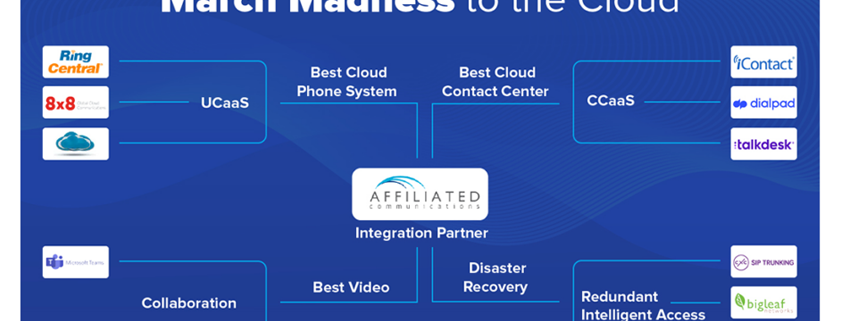March Madness to the Cloud: Which Team Will You Pick?
There are a lot of cloud and business phone systems companies out there today, and different vendors have various strengths depending on your wants and needs. Sometimes, choosing between them can feel a bit like developing your own personal March Madness bracket.
March Madness bracketology is both an art and a science. By examining stats and using a bit of math, a cunning bracketologist can develop a thoughtful analysis of the season’s current standings that gives them as much information as possible for their final predictions.
The same thought process applies when you need to change your business phone system. Most areas offer a few different choices for companies specializing in unified communications, and they all have their specialties and unique qualities. However, evaluating how those strengths can impact your business can be complex.
Today, we’ll share tips and techniques for business and IT leaders to use when evaluating their options for business phone system providers, and show how you can tell when you’ve picked a winner.
What to Look for in a Business Phone System
No smart bracketologist rushes into picking teams without first familiarizing themselves with the basics of how their season is going, what players have been excelling, and much more. To ensure you’re picking the right contact center solution for your current needs, you’ll need to have a solid understanding of the features systems like inContact, Dialpad and TalkDesk offer.
Here are some of the most important features you should be considering when evaluating your options for business phone systems.
Flexibility
Even though many businesses are slowly navigating a return to the office, the reality is that flexibility continues to be a necessity. Having the ability to work remotely has become a top priority for many employees. If your cloud services don’t support remote or hybrid work options, you may soon find yourself falling behind companies that do.
Business phone systems are critical to supporting this flexibility, allowing workers to be productive and secure no matter where they log in.
Better networking and collaboration technology
Of course, it’s no good offering employees the ability to work remotely if they can’t communicate and collaborate seamlessly while they do. Networking and collaboration features like Microsoft Teams or Zoom have become a part of our daily lives, and employees want to be able to use them securely with both colleagues and customers, regardless of whether they’re working from home or in the office.
Better disaster recovery solutions
Over the last few years, Texans have experienced many unusual and unanticipated extreme weather events. To ensure your business is protected from natural disasters and calamities like a data breach no matter where you are located, your cloud contact center system should have baked-in disaster recovery options from providers like BigLeaf and VeloCloud to protect your assets and help get you back to normal faster.
The features of your business phone systems can make a huge difference for your business. Learn more about the business phone systems services we offer at Affiliated Communications.
Factors to Evaluate When Considering a Move to the Cloud
Now that you understand the critical features of a business phone system, it’s time to consider how you’ll know when to make a move to the cloud. Many organizations are tempted by advantages like easy maintenance, scalability and rapid elasticity, without realizing how big a difference this new system can make to their daily operations.
Take on-demand self-service as an example. This feature allows your team to constantly monitor your server and other resources and change them at will. This prevents you from overpaying for compute power or resources that you just aren’t using.
Another benefit that can directly impact how your business operates is automation. By reducing manual effort through the deployment of AI and machine learning, you can automate many of the time-consuming routine tasks that are vital to the operational success of your organization.
Even if you think it’s time to move your phone system to the cloud, getting everyone else in your organization on the same page can be challenging. Here’s some more information on making that choice that you can disseminate throughout your company so everyone understands what’s at stake.
Advantages of Unified Communications and UCaaS Systems
Choosing between an on-premises unified communications system and a cloud-based service offering the same or similar features is tough. This is where a lot of businesses find themselves stalled. After all, operating all these on-site features is appealing to some companies that want to bring their own trunks into the system or ensure that on-site maintenance is always possible. Additionally, the system is wholly owned by your business and is safely firewalled off from the public cloud, offering an unprecedented level of control.
However, unified communication as a service (UCaaS) offerings like RingCentral, 8×8, and Clear Cloud have started to grow in popularity, with many businesses eager to take advantage of a cloud-based system. Instead of purchasing and owning the equipment, a UCaaS system is licensed and sits in a secure public cloud while the equipment is rented.
This is an excellent option for businesses that are worried about the costly and time-consuming maintenance that often comes with on-premises options. A UCaaS system also offers security in the event of an on-site incident – if there’s a breach, fire or flood, your data is protected.
Work with Affiliated Communications on Your Move to the Cloud
Determining the right option for your contact center and business phone system is complex. Picking the right time to move and figuring out whether an on-premises or UCaaS system is the way to go requires decision-makers to juggle many variables at one time.
Instead of struggling to make this decision on your own, let Affiliated Communications help. We’ve been working with these companies for years and can help you design a sensible solution for your business.
When you work with us to design and build a unified communications solution that works for your needs, experts are just a phone call away. We’re always available to troubleshoot issues or talk long-term strategies.
Want to learn more about the cloud services we can offer your business? Get in touch with us today.









